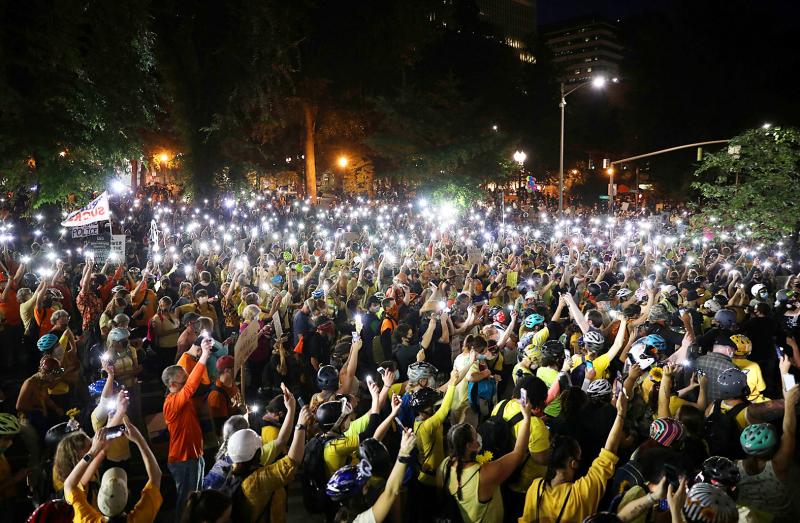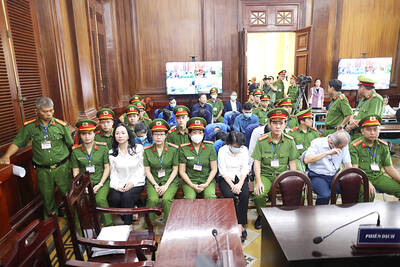Federal officers’ actions at protests in Oregon’s largest city, hailed by US President Donald Trump, but done without local consent, are raising the prospect of a constitutional crisis — one that could escalate as weeks of demonstrations find renewed focus in clashes with camouflaged, unidentified agents outside Portland’s US courthouse.
State and local authorities, who did not ask for federal help, are awaiting a ruling in a lawsuit filed late last week.
Oregon State Attorney General Ellen Rosenblum said in court papers that masked federal officers have arrested people on the street, far from the courthouse, with no probable cause and whisked them away in unmarked cars.

Photo: Reuters
Trump says he plans to send federal agents to other cities, too.
“We’re going to have more federal law enforcement, that I can tell you,” Trump said on Monday. “In Portland, they’ve done a fantastic job. They’ve been there three days, and they really have done a fantastic job in a very short period of time.”
Constitutional law experts said federal officers’ actions in the progressive city are a “red flag” in what could become a test case of states’ rights as the Trump administration expands federal policing.
“The idea that there’s a threat to a federal courthouse and the federal authorities are going to swoop in and do whatever they want to do without any cooperation and coordination with state and local authorities is extraordinary outside the context of a civil war,” said Michael Dorf, a professor of constitutional law at Cornell University.
“It is a standard move of authoritarians to use the pretext of quelling violence to bring in force, thereby prompting a violent response and then bootstrapping the initial use of force in the first place,” Dorf said.
The Chicago Tribune, citing anonymous sources, on Monday reported that Trump planned to deploy 150 federal agents to Chicago.
The American Civil Liberties Union of Oregon has sued in federal court over the agents’ presence in Portland, and the organization’s Chicago branch said it would similarly oppose a federal presence.
“This is a democracy, not a dictatorship,” Oregon Governor Kate Brown, a Democrat, said on Twitter. “We cannot have secret police abducting people in unmarked vehicles. I can’t believe I have to say that to the President of the United States.”
The US Department of Homeland Security (DHS) tweeted that federal agents were barricaded in Portland’s US courthouse at one point and had lasers pointed at their eyes in an attempt to blind them.
“Portland is rife with violent anarchists assaulting federal officers and federal buildings,” the tweet said. “This isn’t a peaceful crowd. These are federal crimes.”
Top leaders in the US House of Representatives on Sunday said that they were “alarmed” by the Trump administration’s tactics in Portland and other cities. They have called on federal inspectors general to investigate.
Trump, who has called the protesters “anarchists and agitators,” said the DHS and US Department of Justice agents are on hand to restore order at the courthouse and help Portland.
Nightly protests, which began after George Floyd’s death at the hands of Minneapolis police, have devolved into violence.
The Trump administration’s actions run counter to the usual philosophies of US conservatives, who typically treat state and local rights with great sanctity and have long been wary of the federal government — particularly its armed agents — interceding in most situations.
One prominent Republican, Senator Rand Paul, who is from the libertarian-leaning flank of the party, criticized federal policing.
“We cannot give up liberty for security. Local law enforcement can and should be handling these situations in our cities but there is no place for federal troops or unidentified federal agents rounding people up at will,” Paul said in a tweet on Monday.
The protests have roiled Portland for 52 nights. Many rallies have attracted thousands and been largely peaceful, but smaller groups of up to several hundred people have focused on federal property and local law enforcement buildings, at times setting fires to police precincts, smashing windows and clashing violently with local police.
Portland Mayor Ted Wheeler, who has been under fire for his handling of the protests, said on national TV talk shows on Sunday that the demonstrations were dwindling before federal officers engaged.
“They are sharply escalating the situation. Their presence here is actually leading to more violence and more vandalism. And it’s not helping the situation at all,” Wheeler said on CNN’s State of the Union.
“They’re not wanted here. We haven’t asked them here,” Wheeler said. “In fact, we want them to leave.”
“It seems clear that there were at least some federal crimes committed here,” said Steve Vladeck, a constitutional law professor at the University of Texas. “But the notion that a handful of federal crimes justifies a substantial deployment of federal law enforcement officers to show force on the streets is, to my mind, unprecedented.”
“Federal law enforcement is not a political prop,” Vladeck said.

Republican US lawmakers on Friday criticized US President Joe Biden’s administration after sanctioned Chinese telecoms equipment giant Huawei unveiled a laptop this week powered by an Intel artificial intelligence (AI) chip. The US placed Huawei on a trade restriction list in 2019 for contravening Iran sanctions, part of a broader effort to hobble Beijing’s technological advances. Placement on the list means the company’s suppliers have to seek a special, difficult-to-obtain license before shipping to it. One such license, issued by then-US president Donald Trump’s administration, has allowed Intel to ship central processors to Huawei for use in laptops since 2020. China hardliners

A top Vietnamese property tycoon was on Thursday sentenced to death in one of the biggest corruption cases in history, with an estimated US$27 billion in damages. A panel of three hand-picked jurors and two judges rejected all defense arguments by Truong My Lan, chair of major developer Van Thinh Phat, who was found guilty of swindling cash from Saigon Commercial Bank (SCB) over a decade. “The defendant’s actions ... eroded people’s trust in the leadership of the [Communist] Party and state,” read the verdict at the trial in Ho Chi Minh City. After the five-week trial, 85 others were also sentenced on

‘DELUSIONAL’: Targeting the families of Hamas’ leaders would not push the group to change its position or to give up its demands for Palestinians, Ismail Haniyeh said Israeli aircraft on Wednesday killed three sons of Hamas’ top political leader in the Gaza Strip, striking high-stakes targets at a time when Israel is holding delicate ceasefire negotiations with the militant group. Hamas said four of the leader’s grandchildren were also killed. Ismail Haniyeh’s sons are among the highest-profile figures to be killed in the war so far. Israel said they were Hamas operatives, and Haniyeh accused Israel of acting in “the spirit of revenge and murder.” The deaths threatened to strain the internationally mediated ceasefire talks, which appeared to gain steam in recent days even as the sides remain far

RAMPAGE: A Palestinian man was left dead after dozens of Israeli settlers searching for a missing 14-year-old boy stormed a village in the Israeli-occupied West Bank US President Joe Biden on Friday said he expected Iran to attack Israel “sooner, rather than later” and warned Tehran not to proceed. Asked by reporters about his message to Iran, Biden simply said: “Don’t,” underscoring Washington’s commitment to defend Israel. “We are devoted to the defense of Israel. We will support Israel. We will help defend Israel and Iran will not succeed,” he said. Biden said he would not divulge secure information, but said his expectation was that an attack could come “sooner, rather than later.” Israel braced on Friday for an attack by Iran or its proxies as warnings grew of